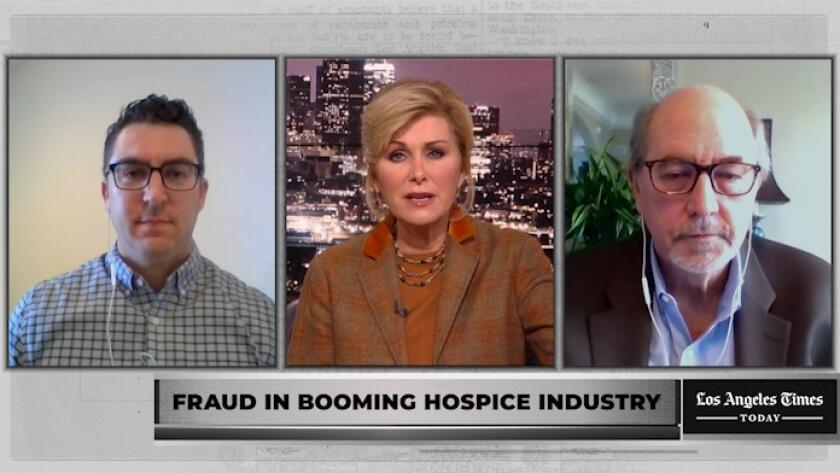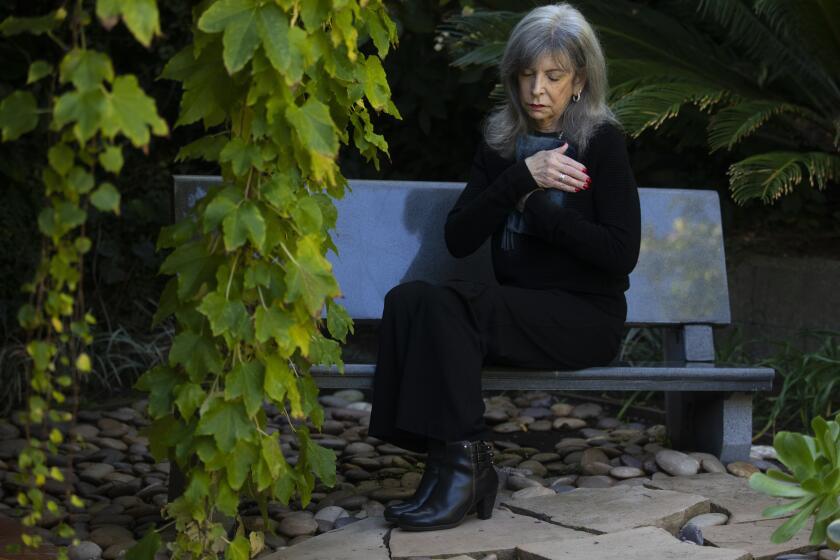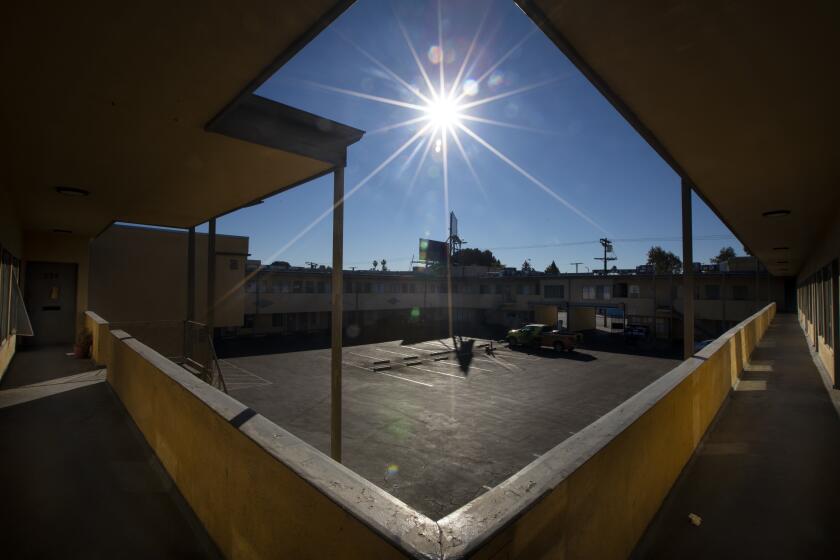Doctors, nurses and others charged with taking kickbacks in end-of-life fraud case
- Share via
Watch L.A. Times Today at 7 p.m. on Spectrum News 1 on Channel 1 or live stream on the Spectrum News App. Palos Verdes Peninsula and Orange County viewers can watch on Cox Systems on channel 99.
- Share via
They were supposed to be near death and in desperate need of end-of-life care to ease their pain.
Authorities, however, allege that many of the patients were not dying but merely unwitting pawns in a sophisticated Medicare fraud scheme engineered by two Inland Empire couples who took in more than $4.2 million in federal reimbursements.
State prosecutors say the couples ran two hospice businesses and paid doctors and others for bogus diagnoses or illegal kickbacks for patient referrals — accusations that mirror the type of widespread hospice fraud detailed in a 2020 Los Angeles Times investigation of the industry.
The California attorney general’s office said 16 people face multiple felony counts including conspiracy to commit insurance fraud, insurance fraud and grand theft, and some also face charges related to identity theft, money laundering and tax evasion. All but two of the 16 have been arrested, officials said.
“End-of-life care is a difficult process for families to endure, and patients should be able to trust that their hospice providers are acting in good faith,” said Atty. Gen. Rob Bonta, who unveiled the charges Thursday. “The crimes allegedly committed by the defendants against their patients, Medicare and our state’s Medi-Cal program will not be tolerated.”
Decades of unchecked growth came to a halt Jan. 1, when a moratorium on new state hospice licenses took effect along with reforms aimed at curbing widespread fraud in end-of-life care. The measures were largely spurred by the Times investigation, lawmakers said.
An extensive examination by the state auditor also is underway to identify deficiencies and recommend improvements to hospice licensing and oversight. Results are to be released next month.
The defendants in the latest prosecution include two married couples — Ralph Canales and Rochell Paragados Canales, and Giovanni Ibale and Maureen Ibale — who together operated New Hope Hospice Inc. and Sterling Hospice Care Inc. in San Bernardino County, according to the felony complaint.
Nowhere has the hospice industry’s growth been more explosive, and its harmful side effects more evident, than in Los Angeles County.
San Bernardino County jail records show that the Canaleses are being held in lieu of $4.2-million bail and court records show that arrest warrants have been issued for the Ibaleses. The two couples could not immediately be reached for comment.
The state’s allegations span 2015 to 2021.
“Among the patients who were illegally referred to Sterling and New Hope were patients who had no idea they were ever placed on hospice,” according to the complaint, which noted that some received care for more than two years.
Bonta said investigators had identified at least 30 patients who were considered to be victims of the fraud.
Some of the defendants face up to 27 years in prison if convicted, Bonta said. Two of those arrested are doctors and three are nurses, he said.
The Times investigation found that explosive growth in providers had transformed end-of-life care that was once the domain of charities and religious groups into a multibillion-dollar industry dominated by profit-driven operators.
The rapid expansion spawned widespread fraud, negligence and mistreatment of some of California’s most vulnerable residents, the newspaper found.
Over the last two decades, the number of U.S. providers has roughly doubled, while Medicare spending on hospice care grew by more than six times, to nearly $21 billion a year as of 2021. More than 1.6 million Medicare beneficiaries now receive care from about 5,000 hospices, the vast majority of them for-profit operators.
Los Angeles County’s hospices multiplied sixfold in the last decade, accounting for more than half of the state’s roughly 1,200 Medicare-certified providers in 2020, The Times’ analysis of federal healthcare data showed.
A Times investigation found care failures at hospices, including mismanaged medications, neglected wounds and missed appointments.
Scores of hospices had sprung up along a corridor stretching west from the San Gabriel Valley through the San Fernando Valley, which had the highest concentration of providers in the nation at the time. Glendale had 60 hospices, while Burbank had 61 and Van Nuys 63. New York state and Florida each had fewer than 50.
To qualify for hospice care, patients must be certified as terminally ill by their attending physicians, if they have them, and by a hospice doctor.
But many of those signed up by recruiters with promises of medical care, equipment or housekeeping services were not dying, The Times found. Some later learned they had signed away their rights to lifesaving emergency medical treatment.
Many of the state’s hospices are small operations, run by people with little or no healthcare experience. There are few qualifications for starting or operating a hospice beyond having a clean felony record and getting a state license and Medicare certification, a process that costs only a few thousand dollars.
The licensing moratorium — which includes exemptions for pending applications and for those that can document a need for a new hospice in a particular geographic area — will remain in effect for 365 days after the audit report is published, which is projected to be in March, according to the auditor’s office.
Among other things, the audit will evaluate the growth of hospice providers in California over the last decade and the factors that led to it. It also will assess the scope of hospice fraud and abuse in California and their impact on the Medicare and Medi-Cal programs, which pay for most end-of-life care.
More to Read
Sign up for Essential California
The most important California stories and recommendations in your inbox every morning.
You may occasionally receive promotional content from the Los Angeles Times.













